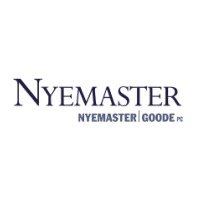Best Antitrust Litigation Lawyers in Cedar Rapids
Share your needs with us, get contacted by law firms.
Free. Takes 2 min.
List of the best lawyers in Cedar Rapids, United States
About Antitrust Litigation Law in Cedar Rapids, United States
Antitrust litigation refers to legal actions taken to address violations of competition laws designed to protect trade and commerce from unfair business practices. In Cedar Rapids, United States, antitrust laws are enforced to safeguard consumers, ensure fair competition among businesses, and prevent monopolistic behaviors. These cases often involve disputes over price fixing, bid rigging, monopolies, market allocation, and other actions that may harm competitive market conditions. Federal statutes, most notably the Sherman Act and the Clayton Act, provide the basis for many antitrust cases, and these are enforced in conjunction with state-specific laws governing competition.
Why You May Need a Lawyer
Individuals and businesses in Cedar Rapids may require legal assistance in antitrust matters for various reasons. Common situations include:
- You suspect a competitor is engaging in price fixing or collusive bidding that harms your business.
- Your business is being investigated or sued for alleged antitrust violations.
- You are part of an industry where market allocation or monopolistic behavior is suspected.
- You have concerns about business mergers or acquisitions that could limit competition.
- You want to ensure compliance with state and federal antitrust laws during business expansion or collaboration.
- You have been harmed as a consumer or competitor by unfair business practices violating competition laws.
An experienced antitrust litigation lawyer can help evaluate your case, represent you in court, respond to government investigations, negotiate settlements, and provide strategic advice for compliance and risk management.
Local Laws Overview
In Cedar Rapids, as part of the state of Iowa, antitrust litigation is shaped by a combination of federal and state laws. The primary federal antitrust laws that apply are the Sherman Act, the Clayton Act, and the Federal Trade Commission Act. These laws prohibit agreements that restrain trade, abuse of dominant market positions, and anticompetitive mergers or acquisitions.
Iowa has its own specific antitrust statutes outlined in Chapters 553 and 554 of the Iowa Code. These statutes complement federal law and can apply to businesses and individuals operating within Cedar Rapids. Enforcement actions in Iowa can be initiated by the Iowa Attorney General’s office or by private parties who have been harmed by anticompetitive conduct. Penalties can include fines, injunctions, treble damages, and court orders to halt unlawful practices.
Frequently Asked Questions
What is antitrust litigation?
Antitrust litigation involves legal disputes or enforcement actions arising from violations of competition laws designed to prevent unfair restraint of trade and monopolistic practices.
Who enforces antitrust laws in Cedar Rapids?
Both federal agencies such as the Department of Justice and the Federal Trade Commission, as well as the Iowa Attorney General’s office, are responsible for enforcing antitrust laws in Cedar Rapids.
What are examples of antitrust violations?
Common violations include price fixing, bid rigging, market allocation, agreements to boycott, and mergers that may substantially lessen competition.
Can individuals or companies sue for antitrust damages?
Yes, both individuals and businesses that suffer harm from antitrust violations can file private lawsuits seeking damages, including treble damages under certain circumstances.
What should I do if I am accused of violating antitrust laws?
Immediately seek legal advice from a qualified antitrust litigation lawyer to understand the allegations, your rights, and potential defenses.
How can I report suspected antitrust violations?
You can contact the Iowa Attorney General’s office or federal authorities such as the Department of Justice Antitrust Division for reporting suspected violations.
Are all business collaborations illegal under antitrust law?
No, not all collaborations are illegal. Many joint ventures and collaborations are permissible if they foster competition or benefit consumers. Legal guidance is essential for assessing the risks involved.
What penalties can result from violating antitrust law?
Penalties may include substantial fines, orders to halt illegal activity, monetary damages awarded to injured parties, and, in some cases, imprisonment for individuals involved in serious violations.
How long do I have to file an antitrust lawsuit?
The time limit, or statute of limitations, for filing an antitrust lawsuit varies but is generally four years from the date of the violation, with certain exceptions.
What role does the Iowa Attorney General play in antitrust cases?
The Iowa Attorney General investigates and prosecutes violations of state antitrust laws, can join federal investigations, and may represent consumers and businesses harmed by anticompetitive conduct.
Additional Resources
If you need more information or assistance, the following resources can be helpful:
- Iowa Attorney General’s Office - Consumer Protection Division (handles antitrust complaints and investigations)
- United States Department of Justice Antitrust Division (federal enforcement and guidance)
- Federal Trade Commission - Bureau of Competition (enforces antitrust laws and provides educational materials)
- Iowa State Bar Association (offers referrals for antitrust litigation lawyers in Cedar Rapids)
- Community Legal Aid organizations (may assist with initial consultations or referrals for qualifying individuals)
Next Steps
If you suspect antitrust misconduct or are facing antitrust allegations in Cedar Rapids, it is important to act quickly. Here are recommended actions:
- Document any evidence or communications related to the potential violation.
- Contact an experienced antitrust litigation lawyer in Cedar Rapids for a confidential consultation.
- Do not attempt to resolve suspected legal issues or respond to investigations without legal counsel.
- If you are a business, review your compliance procedures and collaborate with counsel to assess risk and implement best practices.
- Reach out to the relevant governmental agencies or bar associations listed in the Additional Resources section for further guidance.
Taking early and informed action can protect your interests, whether you are a business owner, individual, or consumer affected by or accused of antitrust violations.
Lawzana helps you find the best lawyers and law firms in Cedar Rapids through a curated and pre-screened list of qualified legal professionals. Our platform offers rankings and detailed profiles of attorneys and law firms, allowing you to compare based on practice areas, including Antitrust Litigation, experience, and client feedback.
Each profile includes a description of the firm's areas of practice, client reviews, team members and partners, year of establishment, spoken languages, office locations, contact information, social media presence, and any published articles or resources. Most firms on our platform speak English and are experienced in both local and international legal matters.
Get a quote from top-rated law firms in Cedar Rapids, United States — quickly, securely, and without unnecessary hassle.
Disclaimer:
The information provided on this page is for general informational purposes only and does not constitute legal advice. While we strive to ensure the accuracy and relevance of the content, legal information may change over time, and interpretations of the law can vary. You should always consult with a qualified legal professional for advice specific to your situation.
We disclaim all liability for actions taken or not taken based on the content of this page. If you believe any information is incorrect or outdated, please contact us, and we will review and update it where appropriate.









